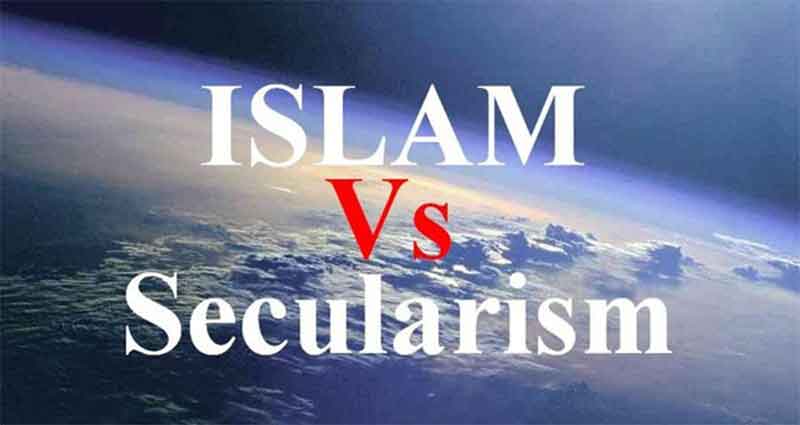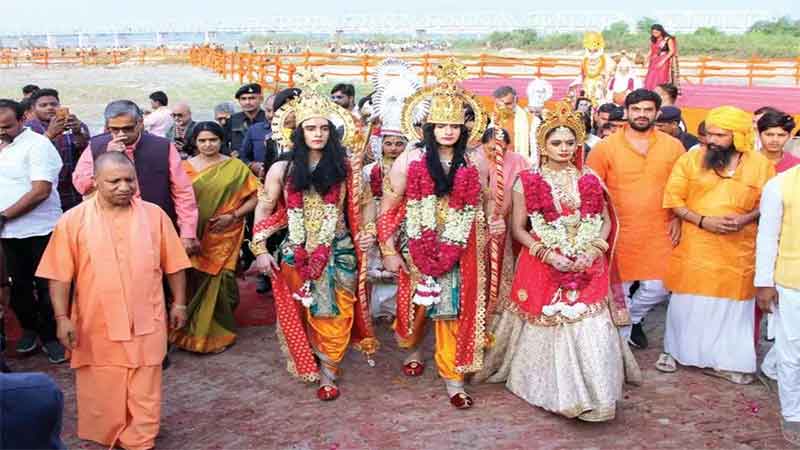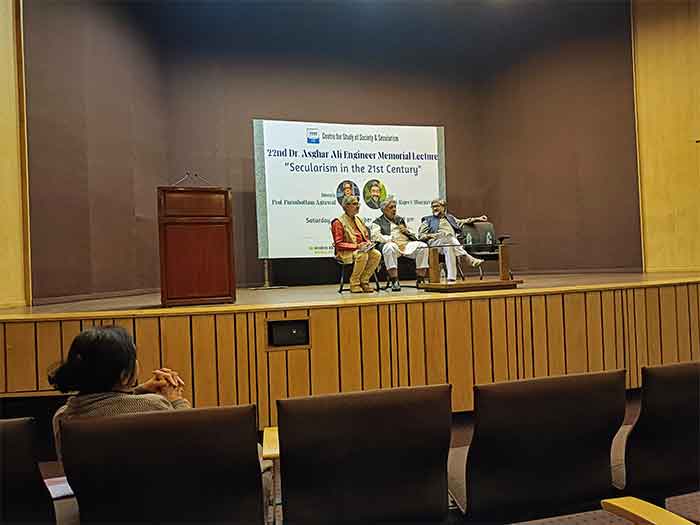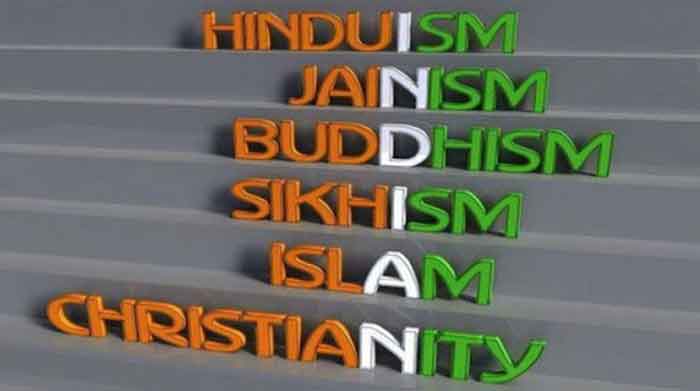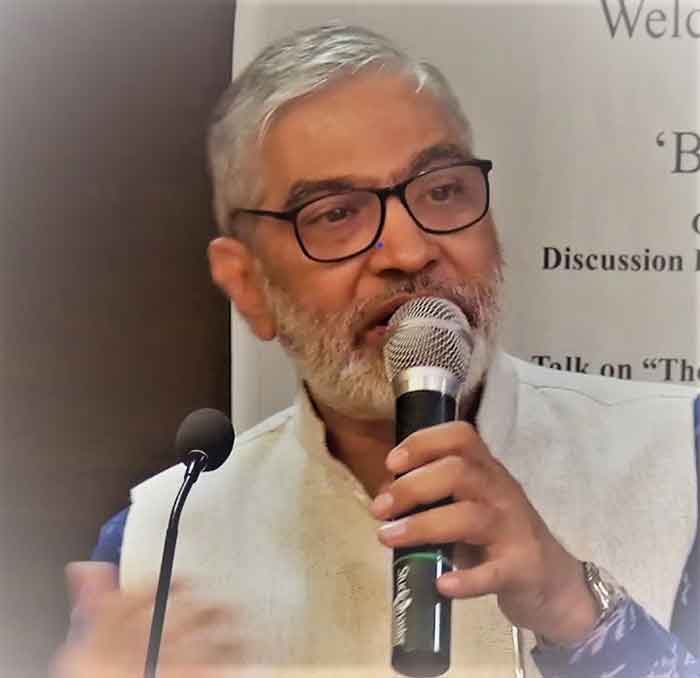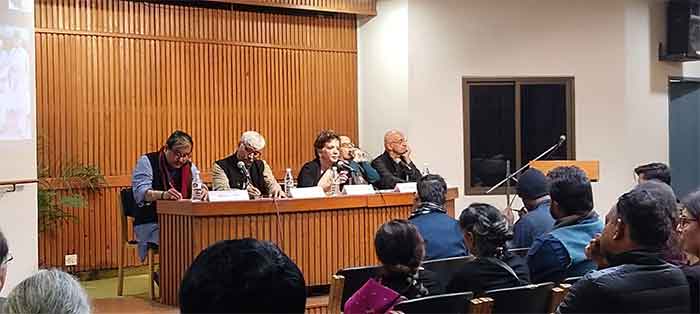
On 8th December 2023, a panel discussion was jointly organized by the India International Centre, and the Centre For Equity Studies on the theme of “Secularism in the Indian Constitution”, in which eminent academics and Member of Parliament(Rajya Sabha) Prof. Manoj Jha, Prof. Apoorvanand , Prof. Zoya Hasan and Dr. Harsh Mander have spoken and put forward their views on range of ideas such as secularism, constitutional morality, equality, freedom, fraternity, compassion, solidarity and justice including democracy. However , all these constitutional values and more importantly, secularism as concept is now under threat and seen as appeasement of minority communities(especially Indian Muslims) by the current ruling political dispensation, and as a result now disappearing from public and political discourse. Forget for a while ruling dispensation like BJP’s stand on secularism and minority rights, even so-called secular including social justice parties are now maintaining strategic silence on said issues especially related to Indian Muslim, as reminded by Harsh Mander. The discussion was moderated by an eminent political theorist Prof. Neera Chandhok.
It has to be noted both the Indian Constitution, as political document and Secularism as a concept, are under threat in the current political scenario. Recently, Chairman of Economic Advisory Council to the Prime Minister, Bibek Debroy in his article has argued that Constitution is Colonial document and need to be changed. Similarly, members of Hindu nationalist party had have often argued that the words like socialism and secularism need be removed from the Constitution of India ,because both words were added in the preamble during emergency phase by the then Prime Minister of India , Indira Gandhi .
Apart from Hindu nationalist forces, even well-known academics like, Prof. Ashis Nandy and Prof. T. N Madan have consistently argued that secularism as concept that had emerged in the European society and therefore, it is an alien concept and cannot be implanted in deeply religious society of South Asian countries including India.
Contrary to Nandy and Madan, eminent political theorists like Neera Chandhoke, and Rajeev Bhargava in their writings have consistently argued that Indian Secularism is not an alien concept, it is deeply embedded in the Constitution of India and inherited from the freedom struggle. Historically speaking, secularism is deeply rooted in heterodox traditions of history and culture of our country. From Budha, Ashoka, Akbar, and Kabir to Gandhi, Ambedkar and Nehru all had represented secular and pluralistic traditions of India. While deliberating on pertinent theme, the speakers like Mander and Zoya Hasan have argued that, it is worthwhile to reclaim the secularism as relevant concept and need to be forcefully defended amidst threat of majoritarian right-wing politics.
Prof. Zoya Hasan has underlined that secularism and democracy is companion concepts and cannot be conceptualized separately. Normatively speaking, Indian secularism (contrary to western secularism) is based on “principled distance” which promote diversity, pluralism and maintain critical respect to all religion, as argued by Prof. Rajeev Bhargava. While referring to judgment of S.R. Bommai case vs. Union of India(1994) , Prof. Hasan has said that concept of secularism is considered as part of ‘basic structure’ of Indian Constitution and therefore, it cannot be amended by the Parliament. Secularism as an egalitarian concept based on substantive equality not limited to formal equality. In other words, Indian secularism is committed to protect and safeguards the rights of Dalits, women and minorities. It is not based on domination of one religion, one language, one culture and promote homogeneity over heterogeneity, said the speakers
Secularism as concept is needed to maintain harmonious relations between communities, said speaker.
While expressing his views, Prof. Apoorvanad has said that discourse around secularism is limited to section of academic circles and civil society institutions like Centre for Equity Studies and disconnected with masses. He also reminded that secularism as concept has been compromised by Ram Manohar Lohia, ( a socialist leader who championed anti-caste movement), Jayaparkash Narrayan( it was JP who launched ‘total revolution’ and fought against authoritarianism of Indira Gandhi) and V.P Singh, in name of defending democracy and fighting against corruptions. The similar trend could be noticed when the so called Gandhian leader like Anna Hazare for sake of restoration of democracy fighting against corruptions indirectly paved way for majoritarian politics that we are now witnessing in the larger public and political domain.
For instance, it was J.P. who tacitly supported the slogans ( such as Gai humari Mata hai, Abdul Ghafur use Khata hai) launched by communal forces against then the Bihar’s first Muslim Chief Minister Abdul Ghafur, reminded by speaker.
Another speaker, a noted activist Harsh Mander has said that we need to defend secular democracy and equal citizenship rights, freedom, justice and fraternity to promote shared ideas and equal belonging for all without conditionality. For Mander, secularism is equal belonging without conditionality, that is a soul of our Constitution. In a secular state, citizen have more rights and it is the duty of state to protect rights of every citizen irrespective caste, gender and religion,etc. Fighting against, caste and protecting gender rights is part of Secularism and Constitutional morality, emphasized by speaker. State can intervene when communities violates principle of constitutional morality. More importantly, Mander has reminded that concept of fraternity- bandhutva, (derived from Sanskrit word) is based on idea of shared bond to each other. Apart from fraternity, solidarity and egalitarian compassion that focus on sharing ideas of each other, should be taken seriously. While citing views of a noted American public intellectual like Noam Chomsky who has reminded that the purpose of public policy is to take care of each other, as emphasis by speaker. Indian secularism is based on radical idea of love, as Gandhiji in his last phase of life had practiced and for that finally he was assassinated. In short, feeling of the pain and sharing ideas of fellow human being, is core idea of Indian secularism, added by Mander.
While sharing his idea, Prof, Manoj Kumar Jha has admitted that my optimism is now fading because of political parties have lost battle. While referring to Mohammad Adeeb ( who was former member of Rajya Sabha) earlier suggestion on withdrawal of Muslims from voting and should not participate in election, Jha has pointed that his suggestion on said issue is right in the current political scenario.
It is fact that no political parties are caring about now concept of secularism seriously especially in realm of electoral politics. While expressing his concern about secularism, Jha stated that these days it is pejoratively called “ sikular” by a section of Hindu nationalist forces and now disappear as concept in the public domain and seen as appeasement of minority community especially Indian Muslim.
While responding the question raised by audience, Chandhoke said that that we need to find “third way” in realm of electoral politics and think of how can egalitarian and just society will be realized. The purpose of normative political theory is to realize a goal of a “decent society”. While citing stories of film like Gram Hava( 1974,), Chandhoke said that there is hope for Indian Muslim within the framework of India Constitution. The film depicts that the future of Indian Muslims are not secure in the Islamic state( like Pakistan) or Hindu India , it will be protected in secular state.
While responding question raised by audience on why concepts like secularism and fraternity are now declining in the most public institutions, Mander said that fraternity is most important values of our Constitution and without it, we can’t live together in diverse society like India , as envisioned by Dr. Babasaheb Ambedkar long ago. The fact is that all political parties irrespective of ideological affiliations are now maintaining strategic silence on minority rights and hesitant to speak on concern of Muslim community, said Mander. To overcome extremely critical situations, we the people of India, need to fight and defend the Secularism and Constitutional morality in the lager public domain, he added.
While responding the question on legitimacy of Constituent Assembly( to frame the Constitution) especially because it was not elected body, respective speakers have underlined that the CA ( Constituent Assembly) was an elected body through limited electoral base and came into existence after anti-colonial movement. The legitimacy of CA was based on idea that it was represented by different shades of thinking and accommodated all kinds of socio-religious groups and political affiliations.
On the question of how can change and fight against prevailing political scenario in our country, speakers have argued that if India will adopt the method of proportional representation(PR) in realm of electoral politics ( most democratic country of world have adopted method of PR),we would have different political scenario. Therefore, problems also lies in method of First-past-the-post(FPP) voting system currently in practice, added by Hasan.
To summarize discourse so far, one could argued that Indian Secularism and Constitutional morality including egalitarian values like equality, fraternity, freedom and solidarity are under serious threat amidst the rise of majoritarian right-wing politics, as hinted by speakers. To note that the task of political theory is not only diagnosed the problems but suggest possible way and search alternative path to bring out change in the society and politics. In this respect, Neera Chandhoke has put forward hope amidst despair and argued that we need to find “third way” in the light of Constitutional values. Similarly, Prof. Hasan has suggested that majority people still vote against the BJP, if India will adopt the proportional representation(PR) in the realm of electoral politics, it will be difficult for the curent political dispensation to win elections, as stated above.
Dr. Badre Alam khan is PhD from Department of Political Science, University of Delhi. He is currently associated with Karwan-e-Mohabbat.

